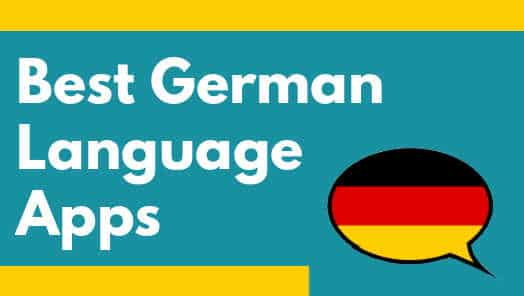Learning a new language opens doors to new cultures, perspectives, and opportunities. German, in particular, is a language spoken by over 100 million people across Europe and beyond, making it an attractive choice for learners worldwide. Whether you’re moving to Germany, doing business with German-speaking partners, or simply expanding your linguistic skills, using language-learning apps can greatly enhance your experience. Here, we explore the best applications designed to help you master the German language.
1. Duolingo: The Fun and Engaging Way to Learn German
Duolingo has become a household name in language learning, and for a good reason. The app is built around a gamified learning experience, making it fun for users to spend time learning German. The lessons are bite-sized, and the app uses daily streaks, rewards, and challenges to keep learners motivated.
Features:
- Free access with optional premium for an ad-free experience.
- Personalized lessons based on your progress and mistakes.
- A mix of listening, speaking, writing, and multiple-choice exercises.
Duolingo is excellent for beginners but may not be sufficient for those who want to reach an advanced level of fluency. The app focuses more on vocabulary and sentence structure than in-depth grammar or conversational skills.
Best for: Casual learners, beginners, and those who want a gamified learning approach.
2. Babbel: In-Depth Grammar and Real-Life Conversations
Babbel is one of the top language-learning apps for German, offering structured courses that cater to different proficiency levels, from beginner to advanced. Unlike Duolingo, Babbel is more focused on grammar and practical, real-life conversational skills.
`
Features:
- In-depth lessons designed by linguists.
- Practical dialogues that simulate real-life conversations.
- Grammar lessons that explain the “why” behind the language.
Babbel provides a comprehensive learning experience with daily reviews to ensure vocabulary retention. However, Babbel is a subscription-based app, and while it’s affordable, it’s not free like Duolingo.
Best for: Learners who want a structured approach and wish to understand the grammar behind the language.
3. Memrise: Visual Learning and Native Speaker Audio
Memrise stands out with its focus on visual and auditory learning. The app uses spaced repetition to help learners remember vocabulary, but it also incorporates videos and audio clips from native speakers, offering a more immersive experience.
Features:
- Thousands of native speaker video clips for pronunciation practice.
- Courses built around real-world language use, not just textbook phrases.
- A mix of visual, auditory, and written exercises.
Memrise is particularly good for improving listening skills and comprehension. However, its focus on vocabulary means it’s better as a supplementary tool rather than a standalone solution for comprehensive learning.
Best for: Visual and auditory learners, and those who want to improve pronunciation.
4. Lingoda: Online Language Classes with Real Teachers
For learners who prefer a more structured approach with real-time feedback from teachers, Lingoda is an excellent option. This platform offers online German classes taught by certified native speakers. The lessons are tailored to individual levels and focus on improving grammar, speaking, and listening skills.
Features:
- Flexible scheduling with group or private lessons.
- Focus on grammar, pronunciation, and real-life conversations.
- Interactive learning in real-time with professional teachers.
Though Lingoda offers high-quality lessons, it comes at a higher price than other apps. However, the personalized attention and real-life conversation practice can be invaluable for serious learners aiming for fluency.
Best for: Learners who want personalized instruction and are willing to invest time and money in real classes.
5. Busuu: Community-Based Learning with Feedback
Busuu offers a unique feature that sets it apart from many language-learning apps: community-based learning. In addition to its structured lessons, Busuu encourages users to interact with native German speakers who provide feedback on written and spoken exercises.
Features:
- Grammar-focused lessons for all levels.
- Feedback from native speakers on exercises.
- Progress tracking with regular assessments.
Busuu’s community-based approach makes it a fantastic tool for learning in a social environment. However, its free version offers limited access to features, and the full experience requires a subscription.
Best for: Learners who thrive in a community environment and value native-speaker feedback.
6. Anki: Custom Flashcards for Advanced Learners
Anki is a powerful flashcard app that can be used for learning almost anything, including German vocabulary and grammar. The app allows users to create their own flashcards or use pre-made decks, focusing on the spaced repetition method to ensure long-term retention of words and phrases.
Features:
- Customizable flashcards with spaced repetition.
- A vast library of pre-made decks created by other users.
- Cross-platform sync across devices.
Anki is particularly useful for advanced learners who need to memorize large amounts of vocabulary. However, it’s less suitable for beginners due to its lack of structured lessons or built-in grammar explanations.
Best for: Advanced learners who want to focus on vocabulary retention through flashcards.
There’s no one-size-fits-all solution when it comes to learning German. Your choice of app should depend on your learning style, goals, and proficiency level. Whether you prefer a fun and casual approach with Duolingo, a structured and grammar-focused experience with Babbel, or personalized instruction with Lingoda, each of these apps offers unique features to support your language-learning journey.
